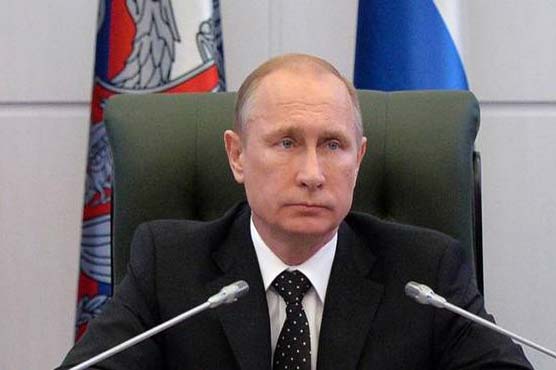Russia brands new sanctions roadblock to Ukraine peace

The ceasefire appears to be holding better than similar previous measures and the number of attacks
KIEV (AFP) - Russia accused the West on Saturday of fuelling unrest in Ukraine by adopting anti-Kremlin sanctions that further erode the prospects of peace talks to end the separatist war.
A Ukranian conference mediated by European and Russian envoys in the Belarussian capital Minsk had initially been set for last week and meant to coincide with a new truce in the eight-month conflict.
The ceasefire appears to be holding better than similar previous measures and the number of daily rocket and mortar attacks across the Russian-speaking eastern regions of Lugansk and Donetsk has gone down.
But Ukrainian forces still reported the loss of five soldiers Friday and have seen 15 servicemen killed since the December 9 deal.
The sudden glimmer of hope that the end of Europe s worst violence since the 1990s Balkans conflicts was approaching has seen Western allies step up their pressure on Russia -- already reeling from its worst economic crisis of Vladimir Putin s 15-year rule.
The United States matched a similar measure by the European Union by slapping a trade ban on Kremlin-controlled Crimea.
Canada went a step further by also targeting Russia s vital oil and gas industry, which accounts for about half the government s tax revenues.
Moscow resolutely denies backing the rebels and brands all steps against it as an effort to either topple Putin or "defang" Russia s military and industrial might.
It called the 13th wave of Western sanctions against it a dangerous step that only hardens the guerrillas resolve.
"We advise Washington and Ottawa to think about the consequences of such actions," the Russian foreign minister said Saturday.
"The sanctions are directed to disrupt the political process," it added.
Crimea s Moscow-backed leader Sergei Aksyonov called the EU sanctions in particular an attempt to "humiliate Russia".
The Black Sea peninsula declared independence in March after being overrun by Russian soldiers who wore unmarked uniforms and denied being sent by Moscow.
Putin brushes off charges of using the same tactics to split off Ukraine s industrial heartland from Kiev to avenge the February ouster a Moscow-backed president.
But the Kremlin chief -- overwhelmingly popular among Russians and increasingly isolated abroad -- has failed to gain much international recognition of Crimea s annexation.
Aksyonov on Saturday hosted his first foreign state visitor -- Zimbabwean Environment Minister Saviour Kasukuwere.
Belarus strongman steps in
Poroshenko was later Saturday to convene his National Security and Defence Council to discuss ways of avoiding repeated disruptions of supplies to his forces in the east.
The emergency meeting comes a day before Belarussian President Alexander Lukashenko pays his first visit to Kiev since his neighbour s historic shift toward the West.
The authoritarian leader has emerged as the conflict s unlikely peacemaker -- his own independence from Moscow undermined by a heavy reliance on Russian energy subsidies and beneficial trade rules.
The timing of Lukashenko s visit signals that the peace talks are unlikely to take place on Sunday as both Poroshenko and his European supporters had hoped.
Several rebel commanders have said they would not be ready until at least Monday or Tuesday. A Skype video conference between the sides Friday failed to resolve the dispute.
German Chancellor Angela Merkel and -- more recently -- French President Francois Hollande have been spearheading Western efforts to get the sides talking while Washington plays a backseat role.
Both leaders are this weekend expected to hold their third teleconference with Putin and Poroshenko in the space of a week.
The Minsk meeting appears to be hung up over Poroshenko s refusal to discuss one of the separatists main demands -- that he resume the social welfare payments to the war-torn region that Kiev suspended last month.
Poroshenko argues that the money is being stolen by the insurgents and used to pay guerrillas and foreign mercenaries.
The militias inability to improve life in the socially devastated region threatens to turn the locals against them and undermine their claims of legitimacy.

